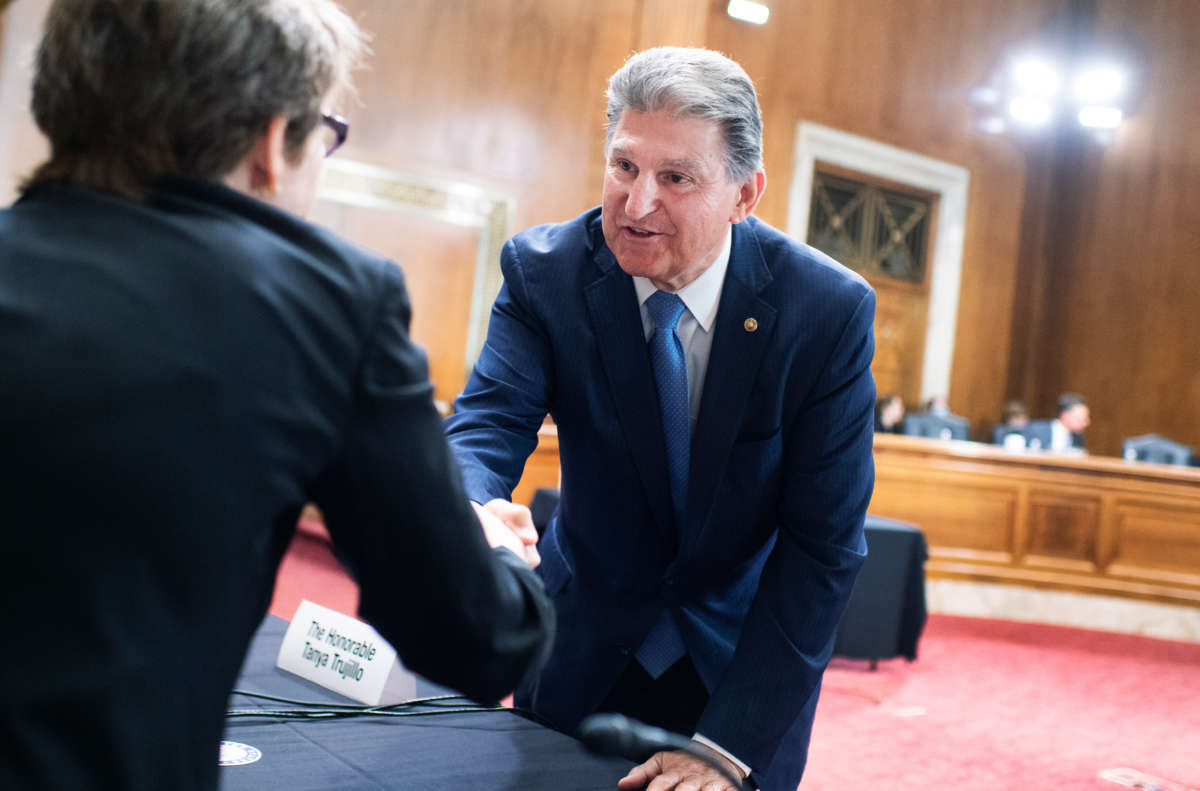Sen. Joe Manchin (D-West Virginia) said on Tuesday that he’s supportive of Democrats’ plan to pass a reconciliation package, though he expressed reservations about its size and tying the package to the bipartisan infrastructure bill.
Manchin, who was part of the bipartisan group of senators who convinced President Joe Biden to carve his infrastructure bill to a quarter of its original size, said that he supports proposals to create more of a safety net for American workers and families that will likely be in the reconciliation bill. The reconciliation package could be passed with only Democrats and progressives in favor, bypassing Republicans altogether.
“We’re going to have to work it through reconciliation, which I’ve agreed that that can be done,” said Manchin on MSNBC. “I just haven’t agreed on the amount, because I haven’t seen everything that everyone is wanting to put in the bill.”
Sen. Bernie Sanders (I-Vermont) has said that the reconciliation bill will tentatively come to $6 trillion, though details on its size and scope are yet to be determined. Democratic leaders have said that they are hinging their support of the bipartisan infrastructure bill, which excludes the entirety of Biden’s American Families Plan and most of the president’s most significant climate proposals, on the passage of the reconciliation package.
The West Virginia senator’s support is critical for the passage of the package in the evenly divided Senate and a no vote from Manchin could threaten the entire plan.
Manchin tempered his support of the reconciliation package, saying he doesn’t want Democrats to link the two bills together because “we’ve never done legislation that way” and he further emphasized that he wants to ensure the bill “goes through the process.”
However, the reason for Democrats having to come up with creative avenues for passing their agenda is largely Manchin himself. Manchin has spent the last months vehemently defending the Senate filibuster, which Republicans have been using, or threatening to use, to stymie progress in Washington. Additionally, Manchin has also been stubbornly pursuing bipartisanship at every point, including on vital proposals like voting rights, even though Republicans have shown no interest in reciprocation and have clearly stated their objective to hinder Democrats’ agenda at all costs.
Undeterred, Manchin continued to tout the benefits of bipartisanship on MSNBC on Tuesday, calling the bipartisan infrastructure bill a “victory.” The senator also said that the outmoded concept is responsible for Biden being able to pass more legislation in his first few months than any modern president.
That’s simply not true: during his first 100 days, Biden only signed 11 bills, which is relatively low compared to Barack Obama’s 14 bills and Donald Trump’s 28 during the same period in their respective presidencies. Plus, it may be too early to celebrate the infrastructure bill, as Minority Leader Sen. Mitch McConnell (R-Kentucky) began threatening to align his party against the bill immediately after it was unveiled.
Meanwhile, there are a myriad of examples just in the recent months where striving for bipartisanship has blocked important Democratic proposals. The commission to investigate the attack on the Capitol on January 6, for instance, was blocked by Republicans even after Democrats made several concessions in a spirit of bipartisanship and to get more GOP members on board.
But, while Manchin is concerned about watering down legislation to appease Republicans, progressives have begun threatening to withdraw their own support if the bills are not up to their standards. As Sanders said on Monday, he wouldn’t support the bipartisan infrastructure bill if the reconciliation bill isn’t passed concurrently and doesn’t include provisions to help individuals and families in an economy ravaged by the pandemic, as well as combat the climate crisis.
“There will not be a bipartisan infrastructure deal without a reconciliation bill that substantially improves the lives of working families and combats the existential threat of climate change,” Sanders tweeted. “No reconciliation bill, no deal. We need transformative change NOW.”
Luckily for progressives like Sanders and Rep. Jamaal Bowman (D-New York) who are adamantly against major cuts to the infrastructure bill, Democratic leadership has their back for the first time in recent memory. Though Biden walked back his vow to keep the two packages together, Senate Majority Leader Chuck Schumer (D-New York) and House Speaker Nancy Pelosi (D-California) have said that they won’t pass one without the other.
24 Hours Left: All gifts to Truthout now matched!
From now until the end of the year, all donations to Truthout will be matched dollar for dollar up to $18,000! Thanks to a generous supporter, your one-time gift today will be matched immediately. As well, your monthly donation will be matched for the whole first year, doubling your impact.
We have just 24 hours left to raise $18,000 and receive the full match.
This matching gift comes at a critical time. As Trump attempts to silence dissenting voices and oppositional nonprofits, reader support is our best defense against the right-wing agenda.
Help Truthout confront Trump’s fascism in 2026, and have your donation matched now!
